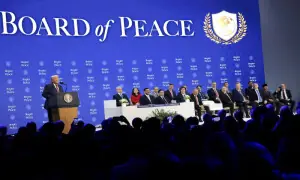Finance Minister Aurangzeb believes new IMF program unlikely to lead to rupee devaluation
2 min readPakistan’s new government is confident that there will be no significant devaluation of its currency as it engages in negotiations with the International Monetary Fund (IMF) to secure substantial lending and support its economic reform agenda, according to a new report by Bloomberg.
According to Finance Minister Muhammad Aurangzeb, there is no justification for the Pakistani rupee to depreciate beyond the typical range of 6% to 8% witnessed in a normal year. The last currency devaluation occurred in January 2023.
While previous IMF loans to Pakistan have often been accompanied by substantial devaluations, which are customary conditions in the IMF’s programs worldwide, the finance minister believes that such drastic measures will not be necessary this time.
In an interview during the IMF and World Bank spring meetings in Washington, he highlighted Pakistan’s healthy foreign-exchange reserves, stable currency, increasing remittances, and steady exports as factors contributing to this outlook. However, he acknowledged that fluctuations in oil prices could pose a potential risk, although projections indicate that Pakistan should be able to manage it.
Aurangzeb, aged 59, stated that the new government in Islamabad aims to strengthen sectors such as agriculture and information technology, providing them with support to drive the nation’s growth rate above 4% in the coming years.
In its negotiations with the IMF, Pakistan intends to pursue a traditional IMF loan through the extended fund facility. Additionally, it seeks funding from the IMF’s new Resilience and Sustainability Trust, designed to assist low-income and vulnerable countries in mitigating external shocks, such as the devastating floods that affected Pakistan in 2022.
Addressing the economic challenges faced by the country, the new government’s priorities include addressing high inflation and low economic growth. Furthermore, Pakistan has approximately $24 billion in external financing requirements for the fiscal year starting in July, which is roughly three times its current reserves. However, Aurangzeb expressed confidence that Pakistan is in a relatively stable position to fulfill these payment obligations.
In the current fiscal year, Pakistan is expected to repay a few billion dollars, but Aurangzeb projected that reserves would reach around $10 billion by the end of June, up from the current $8 billion. At present, the country’s dollar reserves cover approximately two months’ worth of imports.
For the latest news, follow us on Twitter @Aaj_Urdu. We are also on Facebook, Instagram and YouTube.


























Comments are closed on this story.